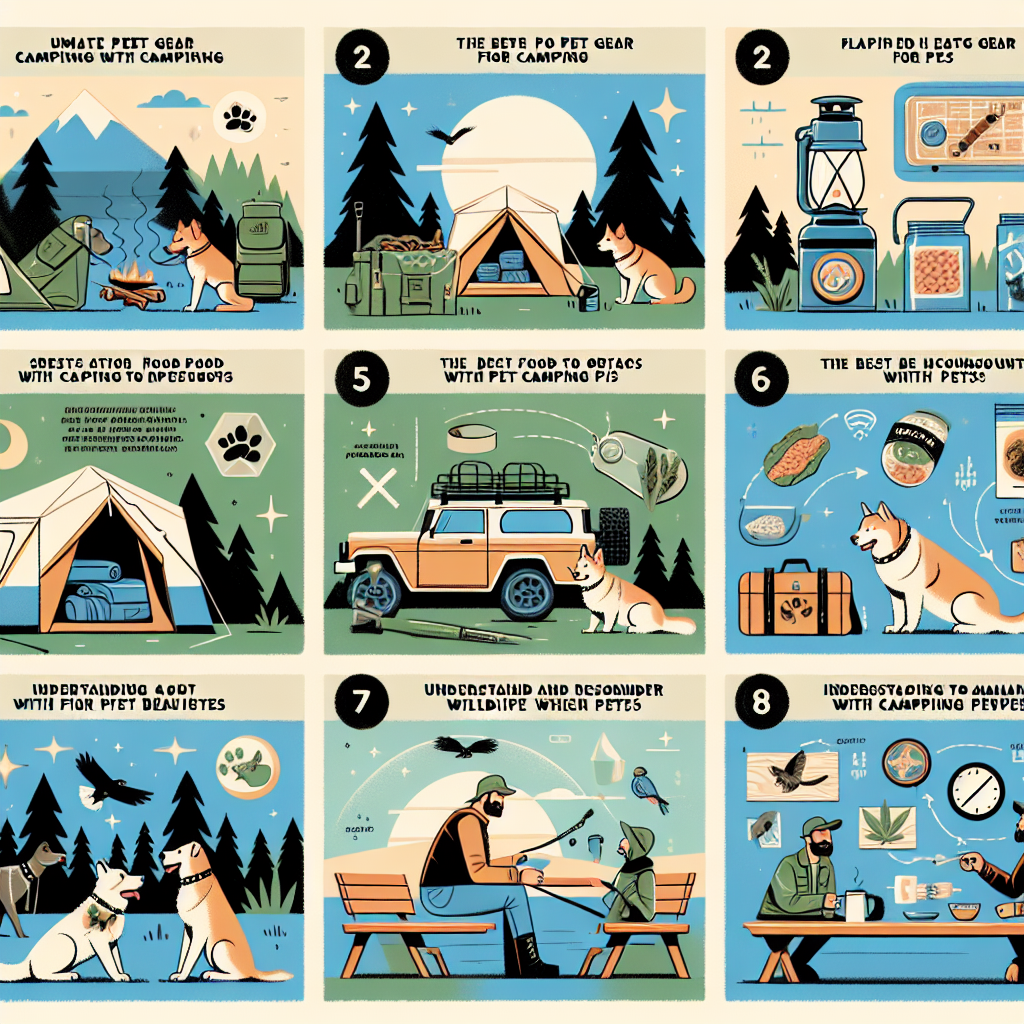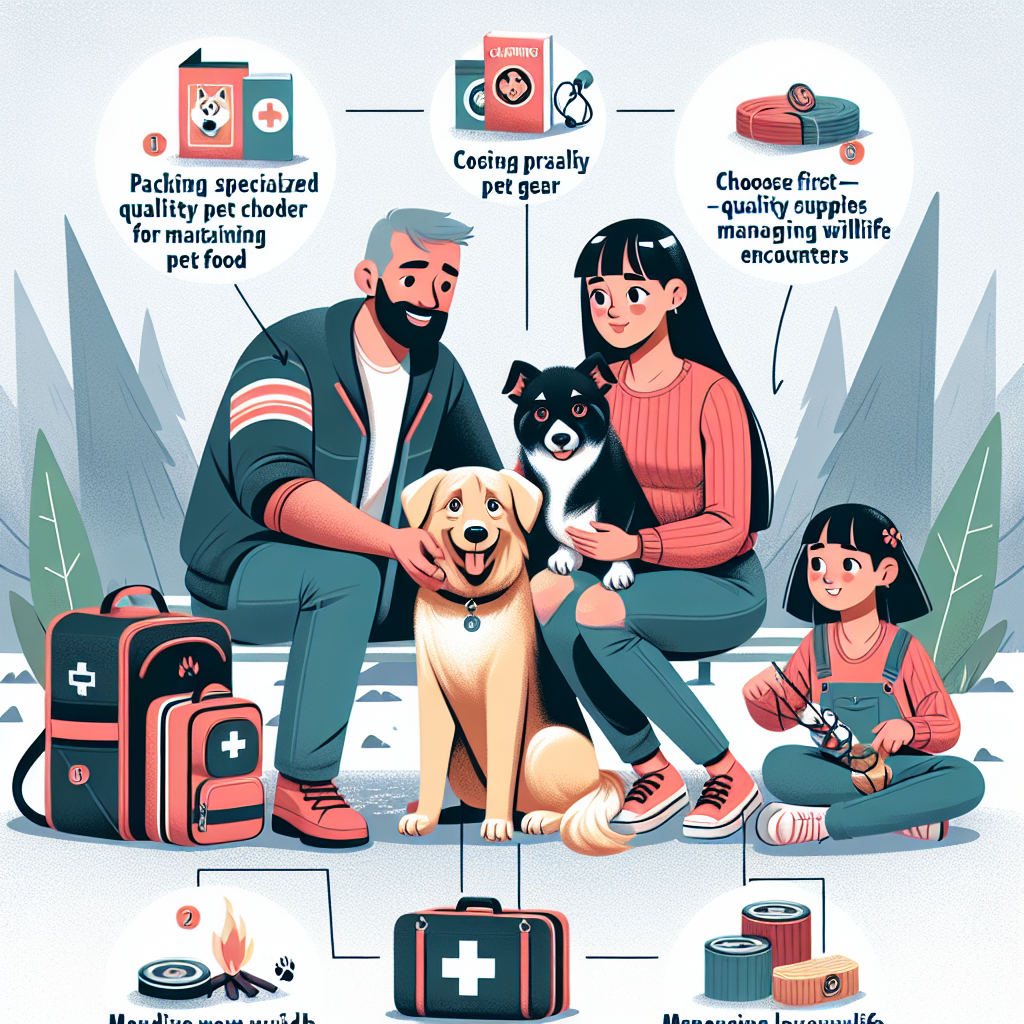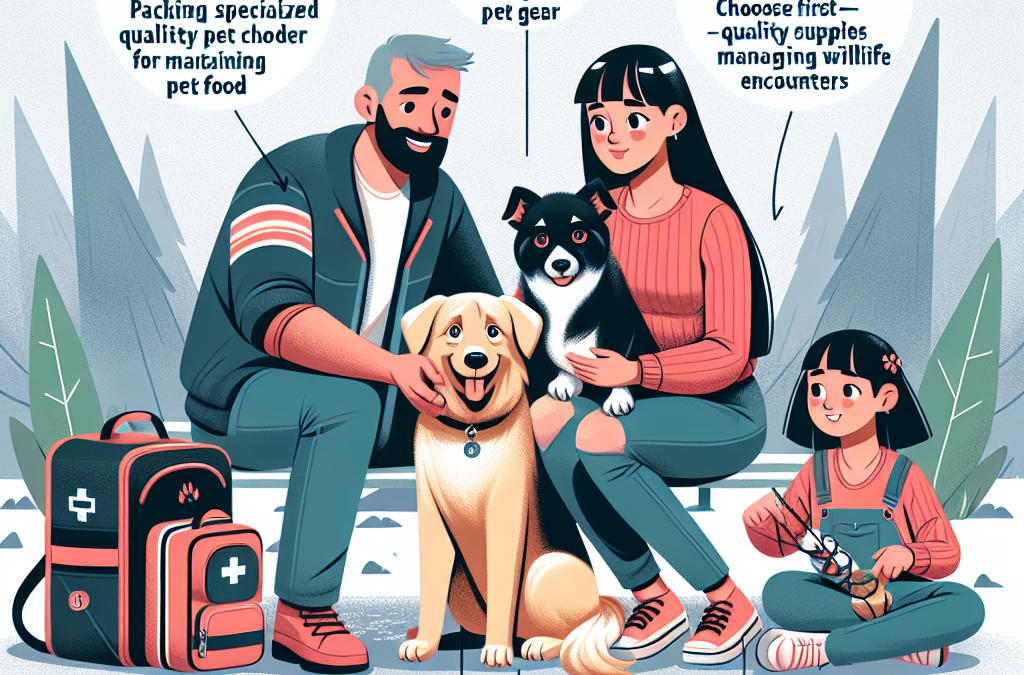Embarking on the adventure of camping with your furry friends can be a delightful experience, but it’s important to keep their safety in mind. The article, “Camping With Pets: Keeping Your Furry Friends Safe”, offers indispensable advice and tips about ensuring your pet’s safety while enjoying the great outdoors together. Discover how to prepare properly for outdoor excursions with your pets, how to deal with potential hazards, and how to make the overall experience enjoyable for both you and your four-legged friends. With careful preparation and awareness, camping can be an exciting and memorable experience for everyone involved.
Select the Right Campsite
When planning a camping trip with your beloved pet, one of the first things you should do is to select the appropriate campsite. It’s not just about the beauty of the surroundings, there’s a lot more to consider to ensure that you and your fur baby have a great time.
Check for pet-friendly campgrounds
Not all campgrounds permit pets. Therefore, it’s crucial to research and select a pet-friendly camping spot. You wouldn’t want to arrive at your chosen campsite only to realize that pets are not allowed. Hence, confirm the rules and regulations of your selected campground before leaving for your trip.
Think about the terrain and environment
Every pet is unique, and what might be a suitable environment for one may not be appropriate for another. Take into account your pet’s size, breed, and health status when choosing a specific campsite. If your pet is still young, avoid areas with steep slopes and make sure there are no steep cliffs or deep water bodies nearby.
Consider the campground facilities
Another factor to consider is the facilities offered by the campsite. Check if there are areas within the campsite for pets to relieve themselves, or whether the campsite provides waste bags. Some pet-friendly campsites might even provide pet washing stations and pet-friendly trails.
Pack Properly for Your Pet
Spending time outdoors with your pet can be an exciting experience. However, it’s essential to pack appropriately to ensure that your pet is comfortable and safe throughout the adventure.
Bring pet-specific camping gear
When camping with your pet, you’ll need to pack some gear specifically for them. This includes a leash, travel water bowl, waste bags, pet food, treats, pet-friendly insect repellent, and a pet bed or blanket. If you’re hiking, consider a pet backpack for carrying their food and water.
Pack enough food and water
Just like humans, pets need to stay hydrated and well-fed during camping trips. Plan to bring enough food and water for the entire duration of your trip. It’s also worth packing a couple of extra days’ worth of supplies in case unplanned circumstances extend your stay.
Have a first-aid kit for your pet
Accidents can happen, and having a well-stocked first aid kit specifically for your pet is essential. This should include bandages, tick removal tools, hydrogen peroxide, and any medications your pet may need. If your pet has specific medical needs, ensure you carry extra medication and familiarize yourself with the nearest veterinary service in the area you’re visiting.

Inspect Your Camping Gear
Your camping gear can greatly influence your pet’s camping experience. Ensuring its safety and functionality is crucial.
Ensure tent is pet-proof
Your pet will likely share your tent when camping. Make sure it’s sturdy and secure enough to prevent your pet from accidentally escaping in the middle of the night. Consider a tent with a tough floor material that can withstand pet claws.
Check for hazardous equipment
Campfires, cooking utensils, lanterns, knives, and other camping tools could harm your pet if not properly stored or used. Always keep them out of reach of your pet when not in use.
Ensure safety of sleeping arrangements
To provide a comfortable resting place for your pet, bring their favorite blanket or bed from home. This will not only keep them cozy but also provide a sense of familiarity, which can be comforting in a new environment.
Identify Potential Dangers in the Wilderness
Regardless of how prepared you are, there can be dangers in the wild that pose a threat to your furry companion. Being alert and knowledgeable will go a long way in ensuring your pet stays safe.
Watch out for toxic plants and insects
Some plants and insects can be toxic to pets if ingested. Be aware of what these are and steer your pet clear of these plants.
Be aware of wildlife
In some areas, there might be wildlife such as bears, foxes, or raccoons that might pose a threat. Keep your pet close and don’t allow them to chase or harass wildlife.
Consider weather conditions
Dogs and cats are particularly sensitive to extreme temperatures. If it’s very hot, ensure your pet has enough shade and water. If it’s cold, ensure your pet has adequate protection, like a doggy sweater or a warm blanket.

Secure Your Pet in the Campsite
Keeping your pet secure is paramount. Here are a few ways you can ensure your pet’s safety:
Use a pet leash or a secure enclosure
Even the most well-behaved pet can become excited or frightened, causing them to run off. A leash or secure enclosure can help keep your pet safe and close to you.
Never leave your pet unattended
Even in seemingly safe environments, it’s essential never to leave your pet unattended. This is crucial not only for your pet’s safety but also for the safety of other campers and wildlife.
Ensure your pet is visible at night
If possible, attach a light or a glow stick to your pet’s collar. This is highly useful for locating your pet quickly in the dark.
Ensure Pet is Up to Date with Vaccinations
Your pet’s health should be a top priority when planning a camping trip.
Check vaccination records before camping
Ensure your pet is up to date with their vaccinations before your camping trip. This is to protect them from any potential diseases they could encounter in the wilderness.
Protect your pet from ticks and fleas
Ticks and fleas are common among wildlife and can cause diseases in animals. Use preventive treatments and check your pet’s fur regularly.
Understand symptoms of common diseases
Understanding the symptoms of common illnesses can help you detect them early and seek veterinary help promptly.
Train Your Pet for Camping
Starting a new activity can be challenging for your pet.
Create a training routine before camping
If your pet has never been camping before, create a training routine simulating the camping experience. This includes basic commands, leash training, and adjusting to sleeping outdoors.
Teach your pet to stay close to the campsite
It’s crucial to teach your pet to stay within the confines of the campsite, especially if they are off-leash. Use treats to reinforce their good behavior.
Practice camping at home
Prior to packing up and hitting the road, consider setting up a tent in your backyard to give your pet a feel of the camping environment. Gradually increase the time spent in the tent to help them adjust.
Maintain Regular Feeding and Sleeping Schedules
Maintaining your pet’s usual routine can make them feel less anxious during your camping trip.
Stick to your pet’s usual routine
Try to keep your pet’s feeding, sleeping, and activity routines the same as at home. This helps to ease their stress and maintain their health.
Avoid over-feeding your pet
Resist the temptation to spoil your pet with extra treats because of their cute begging faces. Overfeeding can lead to digestive discomfort and unhealthy weight gain.
Ensure your pet gets enough rest
Just like at home, ensure your pet has a quiet and comfortable place to sleep.
Keeping Your Pet Hydrated and Fed
Proper nutrition and hydration are extremely important when camping.
Carry enough water and food
Ensure you pack ample food and freshwater for your pet. Never resort to using water from streams or ponds as it could contain harmful bacteria or parasites.
Keep track of your pet’s water intake
Monitor how much your pet drinks to ensure they are properly hydrated. This is especially important in warmer weather.
Avoid sudden diet changes
Maintain your pet’s usual diet during the camping trip. Sudden changes can cause digestive issues or allergies.
Post-camping Check-ups
After your camping trip, make sure to give your pet a thorough check-up.
Examine your pet for ticks and injuries
Ticks are common in many camping areas. Carefully check your pet for ticks or any injuries they might have gotten during the trip.
Visit a vet if necessary
If you observe any signs of illness, do not hesitate to take your pet to a vet for a thorough examination.
Follow up on vaccinations if needed
Finally, if necessary, follow up on any vaccinations your pet might need after the trip.
Camping with your pet can create great memories and strengthen the bond you share. With these tips, you can ensure a safe, fun experience for both you and your pet. Happy camping!

